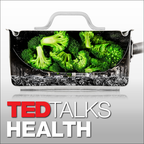
TED Health
Summary: What does exercise do to your brain? Can psychedelics treat depression? From smart daily habits to new medical breakthroughs, welcome to TED Health, with host Dr. Shoshana Ungerleider. TED speakers answer questions you never even knew you had, and share ideas you won't hear anywhere else, all around how we can live healthier lives.
- Visit Website
- RSS
- Artist: TED
- Copyright: TED Conferences LLC
Podcasts:
At TED@Cannes, Gary Wolf gives a 5-min intro to an intriguing new pastime: using mobile apps and always-on gadgets to track and analyze your body, mood, diet, spending -- just about everything in daily life you can measure -- in gloriously geeky detail.
For the last eight years, pop singer Annie Lennox has devoted the majority of her time to her SING campaign, raising awareness and money to combat HIV/AIDS. She shares the experiences that have inspired her, from working with Nelson Mandela to meeting a little African girl in a desperate situation.
In sub-Saharan Africa, HIV infections are more prevalent and doctors scarcer than anywhere else in the world. With a lack of medical professionals, Mitchell Besser enlisted the help of his patients to create mothers2mothers -- an extraordinary network of HIV-positive women whose support for each other is changing and saving lives.
After mapping humans' intricate social networks, Nicholas Christakis and colleague James Fowler began investigating how this information could better our lives. Now, he reveals his hot-off-the-press findings: These networks can be used to detect epidemics earlier than ever, from the spread of innovative ideas to risky behaviors to viruses (like H1N1).
In today's world, balancing school, work, kids and more, most of us can only hope for the recommended eight hours of sleep. Examining the science behind our body's internal clock, Jessa Gamble reveals the surprising and substantial program of rest we should be observing.
Seth Berkley explains how smart advances in vaccine design, production and distribution are bringing us closer than ever to eliminating a host of global threats -- from AIDS to malaria to flu pandemics.
William Li presents a new way to think about treating cancer and other diseases: anti-angiogenesis, preventing the growth of blood vessels that feed a tumor. The crucial first (and best) step: Eating cancer-fighting foods that cut off the supply lines and beat cancer at its own game.
We're all embedded in vast social networks of friends, family, co-workers and more. Nicholas Christakis tracks how a wide variety of traits -- from happiness to obesity -- can spread from person to person, showing how your location in the network might impact your life in ways you don't even know.
Legendary skeptic James Randi takes a fatal dose of homeopathic sleeping pills onstage, kicking off a searing 18-minute indictment of irrational beliefs. He throws out a challenge to the world's psychics: Prove what you do is real, and I'll give you a million dollars. (No takers yet.)
Vaccine-autism claims, "Frankenfood" bans, the herbal cure craze: All point to the public's growing fear (and, often, outright denial) of science and reason, says Michael Specter. He warns the trend spells disaster for human progress.
Armed with bracing logic, wit and her "public-health nerd" glasses, Elizabeth Pisani reveals the myriad of inconsistencies in today's political systems that prevent our dollars from effectively fighting the spread of HIV. Her research with at-risk populations -- from junkies in prison to sex workers on the street in Cambodia -- demonstrates the sometimes counter-intuitive measures that could stall the spread of this devastating disease.
At TEDMED, Eric Dishman makes a bold argument: The US health care system is like computing circa 1959, tethered to big, unwieldy central systems: hospitals, doctors, nursing homes. As our aging population booms, it's imperative, he says, to create personal, networked, home-based health care for all.
Mark Roth studies suspended animation: the art of shutting down life processes and then starting them up again. It's wild stuff, but it's not science fiction. Induced by careful use of an otherwise toxic gas, suspended animation can potentially help trauma and heart attack victims survive long enough to be treated.
Chef Dan Barber squares off with a dilemma facing many chefs today: how to keep fish on the menu. With impeccable research and deadpan humor, he chronicles his pursuit of a sustainable fish he could love, and the foodie's honeymoon he's enjoyed since discovering an outrageously delicious fish raised using a revolutionary farming method in Spain.
Pawan Sinha details his groundbreaking research into how the brain's visual system develops. Sinha and his team provide free vision-restoring treatment to children born blind, and then study how their brains learn to interpret visual data. The work offers insights into neuroscience, engineering and even autism.